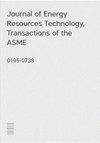Exploring the Impact of CO2 Atmosphere on Propane Moderate or Intense Low-oxygen Dilution Combustion: A Numerical Simulation Study
IF 2.4
3区 工程技术
Q3 ENERGY & FUELS
Journal of Energy Resources Technology-transactions of The Asme
Pub Date : 2023-09-14
DOI:10.1115/1.4063433
引用次数: 0
Abstract
Abstract Moderate or intense low-oxygen dilution (MILD) combustion is a promising combustion technology widely recognized by the international combustion community. In this study, numerical simulation was used to investigate the effects of CO2 atmosphere on MILD combustion of propane in a 20 KW furnace. The results show that the O2/CO2 atmosphere leads to a lower average temperature in the furnace, better temperature uniformity, and more uniform distribution of OH and CH2O compared to MILD combustion in N2/O2 atmosphere. Propane MILD combustion is established well under the physical and chemical effects of CO2. An analytical approach is proposed to describe the physical and chemical effects of CO2 on MILD combustion. The physical effect of CO2 shortens the ignition delay time and advances the pyrolysis and ignition of propane, which causes a high-temperature zone in the front furnace and reduces the temperature uniformity in MILD combustion. However, the chemical effect of CO2 dominates the establishment of the MILD combustion by increasing the ignition delay time and reducing burning rates, with the help of the physical effects of CO2 by intensifying the entrainment in the furnace. Thus, the overall effects of CO2 lead to enhanced temperature uniformity by enlarging the area and evening the temperature of both the ignition zone and combustion zone. These findings provide valuable insights into the physical and chemical mechanisms of CO2 in MILD combustion and have important implications for optimizing combustion processes for improved efficiency and reduced emissions.探讨CO2气氛对丙烷中强低氧稀释燃烧的影响:数值模拟研究
中度或强烈低氧稀释(MILD)燃烧是一种很有前途的燃烧技术,得到了国际燃烧界的广泛认可。本文采用数值模拟的方法研究了CO2气氛对丙烷在20 KW炉内轻度燃烧的影响。结果表明:与N2/O2气氛下的轻度燃烧相比,O2/CO2气氛下的炉内平均温度更低,温度均匀性更好,OH和CH2O分布更均匀;丙烷在CO2的物理和化学作用下可以很好地建立轻度燃烧。提出了一种分析方法来描述CO2对轻度燃烧的物理和化学影响。CO2的物理作用缩短了点火延迟时间,提前了丙烷的热解和点火,导致前炉出现高温区,降低了MILD燃烧时的温度均匀性。然而,CO2的化学作用通过增加点火延迟时间和降低燃烧速率来主导轻度燃烧的建立,而CO2的物理作用通过加强炉内的夹带来帮助建立轻度燃烧。因此,CO2的总体作用是通过扩大点火区和燃烧区面积和降低温度来提高温度均匀性。这些发现为轻度燃烧中二氧化碳的物理和化学机制提供了有价值的见解,并对优化燃烧过程以提高效率和减少排放具有重要意义。
本文章由计算机程序翻译,如有差异,请以英文原文为准。
求助全文
约1分钟内获得全文
求助全文
来源期刊
CiteScore
6.40
自引率
30.00%
发文量
213
审稿时长
4.5 months
期刊介绍:
Specific areas of importance including, but not limited to: Fundamentals of thermodynamics such as energy, entropy and exergy, laws of thermodynamics; Thermoeconomics; Alternative and renewable energy sources; Internal combustion engines; (Geo) thermal energy storage and conversion systems; Fundamental combustion of fuels; Energy resource recovery from biomass and solid wastes; Carbon capture; Land and offshore wells drilling; Production and reservoir engineering;, Economics of energy resource exploitation

 求助内容:
求助内容: 应助结果提醒方式:
应助结果提醒方式:


